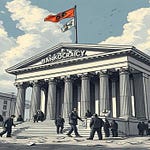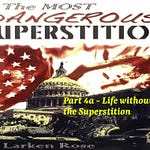The Effects of the Superstition
Effects of the Myth
Throughout the ages, human beings have dung to all sorts of superstitions and false assumptions, many of them relatively harmless. For example, when most people believed the earth to be flat, that factually incorrect notion had little or no impact on how people lived their daily lives, or how they treated one another.
Likewise, if children believe in the tooth fairy, or that storks deliver babies, they are not going to become purveyors of evil as a result of accepting such myths. On the other hand, over the years other false assumptions and myths have posed real dangers to humanity. It could be a simple misunderstanding among doctors, which led them to try “cures” that posed a bigger threat to their patients than the maladies they were trying to treat. As a more drastic example, some cultures offered up human sacrifices, in the hope that doing so would win the favor of their imaginary gods.
But nothing else comes close to the level of destruction – mental, emotional and physical – that has occurred throughout the world, and throughout recorded history, as a result of the belief in “authority”. By dramatically altering how people perceive the world, the myth of “authority” alters their thoughts and actions as well.
In fact, the belief in the legitimacy of a ruling class (”government”) leads nearly everyone to either condone or commit acts of evil without even realizing it. Having been convinced that “authority” is real, and that by way of it, some human beings have acquired the moral right to initiate violence and commit acts of aggression against others ( by way of so-called “laws”), every Democrat, every Republican, every voter, and everyone else who advocates “government” in any form is a proponent of violence and injustice. Of course, they don’t see it that way, because their belief in “authority” has warped and perverted their perception of reality.
The trouble is that when something alters a person’s perception of reality, the person rarely notices it’s happening. For example, the world might look very different to someone wearing colored contact lenses, even though he cannot see the lenses themselves. The same is true of mental “lenses”. Each person thinks that the world is really the way he sees it. Everyone can point to others and claim that they are out of touch with reality, but almost no one thinks that his own perception is skewed, even when others tell him so.
The result is billions of people pointing fingers at each other, telling each other how delusional and misguided they are, with almost none of them willing, or even able, to honestly examine the “lenses” that distort their own perceptions.
Everything a person has been exposed to, especially when young, has an impact on how he views the world. What his parents taught him, what he learned in school, how he has seen people behaving, the culture he grew up in, the religion he was raised in, all create a long-lasting set of mental “lenses” that affect how he sees the world. There are countless examples of how mere differences in perspective have led to horrendous consequences.
A suicide bomber who intentionally kills dozens of civilian strangers imagines that he is doing the right thing. Nearly everyone on both sides of every war imagines himself to be in the right. No one imagines himself to be the bad guy. Military conflicts are entirely the result of differences in perspective resulting from mental “lenses” that have been trained into the soldiers on both sides.
It should be self-evident that if thousands of basically good people were all seeing the world as it is, they would not be desperately trying to kill each other. In most cases, the problem is not actual evil or malice, but simply an inability to see things as they are.
Consider, as an analogy, someone who has ingested a strong hallucinogen and who, as a result, becomes convinced that his best friend is really a malicious alien monster in disguise. From the perspective of the one having hallucinations, violently attacking his friend is perfectly reasonable and justified. The problem, in the case of one whose perception of reality has been so distorted, is not that he is immoral, or that he is stupid, or that he is malicious. The problem is that he is not seeing things as they actually are, and as a result, decisions and actions which seem perfectly appropriate to him are, in reality, horribly destructive. And when such a hallucination is shared by many, the results become far worse.
When everyone has the same misperception of reality – when everyone believes something untrue, even something patently absurd – it doesn’t feel untrue or absurd to them. When a false or illogical idea is constantly repeated and reinforced by nearly everyone, it rarely occurs to anyone to even begin to question it.
In fact, most people become literally incapable of questioning it, because over time it becomes solidified in their minds as a given – an assumption that doesn’t need a rational basis and doesn’t need to be analyzed or reconsidered, because everyone knows it to be true.
In reality, however, each person simply assumes it to be true, because he cannot imagine that everyone else – including all the respectable, well-known, educated people on the radio and TV – could all believe something false. What business does one average individual have doubting something which everyone else seems perfectly comfortable accepting as indisputable truth?
Such deeply entrenched belief is invisible to those who believe it. When a mind has always thought of something in one way, that mind will imagine evidence and hallucinate experience supporting the idea.
A thousand years ago, people would have confidently proclaimed that it was a proven fact that the earth was flat, and they would have said it with just as much certainty and honesty as we now proclaim it to be round. To them, the idea of the world being a giant spherical thing, floating around in space and attached to nothing, was patently ridiculous. And their utterly false assumption about the world being flat would have seemed to them to be a scientific, self-evident fact.
So it is with the belief in “authority” and “government”. To most people, “government” feels like an obvious reality, as rational and self-evident as gravity. Few people have ever objectively examined the concept, because they have never had a reason to. “Everyone knows” that “government” is real, and necessary, and legitimate, and unavoidable.
Everyone assumes that it is, and talks as if it is, so why would anyone question it? Not only are people rarely given a reason to examine the concept of “government”, but they have a very compelling psychological incentive to not examine it.
It is exceedingly uncomfortable and disturbing, even existentially terrifying, for someone to call into question one of the bedrock assumptions upon which his entire view of reality, and his entire moral code, has been based for all of his life.
One whose perception and judgment have been distorted by the superstition of “authority” (and that describes nearly everyone) will not find it easy or pleasant to contemplate the possibility that his entire belief system is based upon a lie, and that much of what he has done throughout his life, as a result of believing that lie, has been harmful to himself his friends and family, and humanity in general.
In short, the belief in “authority” and “government” warps the perception of almost every person, skews his judgment, and leads him to say and do things which are often irrational, or pointless, or counter-productive, or hypocritical, or even horribly destructive and heinously evil.
Of course, the believers in the myth do not see it that way, because they do not see it as a belief at all. They are firmly convinced that “authority” is real, and, based on that false assumption, conclude that their resulting perceptions, thoughts, opinions, and actions are perfectly reasonable, justifiable and proper, just as the Aztecs no doubt believed their human sacrifices to be reasonable, justifiable and proper.
A superstition capable of making otherwise decent people view good as evil, and evil as good – which is exactly what the belief in “authority” does – is what poses the real threat to humanity.
The superstition of “authority” affects the perceptions and actions of different people in different ways, whether it be the “lawmakers” who imagine themselves to have the right to rule, the “law enforcers” who imagine themselves to have the right and obligation to enforce the commands of the “lawmakers”, the subjects who imagine themselves to have the moral duty to obey, or mere spectators looking on as neutral observers.
The effect of the belief in “authority” on these various groups, when taken together, leads to a degree of oppression, injustice, theft and murder which simply could not and would not otherwise exist.














Share this post